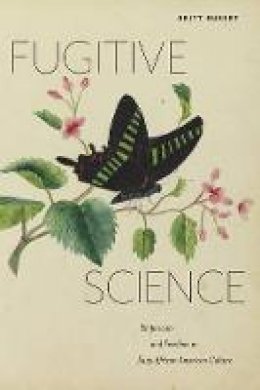
Stock image for illustration purposes only - book cover, edition or condition may vary.
Fugitive Science: Empiricism and Freedom in Early African American Culture (America and the Long 19th Century)
Britt Rusert
€ 48.75
FREE Delivery in Ireland
Description for Fugitive Science: Empiricism and Freedom in Early African American Culture (America and the Long 19th Century)
Paperback. "Also available as an ebook"--Title page verso. Series: America and the Long 19th Century. Num Pages: 320 pages, 19 black & white illustrations. BIC Classification: 3JH; DS; HBL. Category: (G) General (US: Trade). Dimension: 5817 x 3887. .
Honorable Mention, 2019 MLA Prize for a First Book Sole Finalist Mention for the 2018 Lora Romero First Book Prize, presented by the American Studies Association Exposes the influential work of a group of black artists to confront and refute scientific racism. Traversing the archives of early African American literature, performance, and visual culture, Britt Rusert uncovers the dynamic experiments of a group of black writers, artists, and performers. Fugitive Science chronicles a little-known story about race and science in America. While the history of scientific racism in the nineteenth century has been well-documented, there was also a counter-movement of African Americans who worked to refute its claims. Far from rejecting science, these figures were careful readers of antebellum science who linked diverse fields-from astronomy to physiology-to both on-the-ground activism and more speculative forms of knowledge creation. Routinely excluded from institutions of scientific learning and training, they transformed cultural spaces like the page, the stage, the parlor, and even the pulpit into laboratories of knowledge and experimentation. From the recovery of neglected figures like Robert Benjamin Lewis, Hosea Easton, and Sarah Mapps Douglass, to new accounts of Martin Delany, Henry Box Brown, and Frederick Douglass, Fugitive Science makes natural science central to how we understand the origins and development of African American literature and culture. This distinct and pioneering book will spark interest from anyone wishing to learn more on race and society. Honorable Mention, 2019 MLA Prize for a First Book Sole Finalist Mention for the 2018 Lora Romero First Book Prize, presented by the American Studies Association Exposes the influential work of a group of black artists to confront and refute scientific racism. Traversing the archives of early African American literature, performance, and visual culture, Britt Rusert uncovers the dynamic experiments of a group of black writers, artists, and performers. Fugitive Science chronicles a little-known story about race and science in America. While the history of scientific racism in the nineteenth century has been well-documented, there was also a counter-movement of African Americans who worked to refute its claims. Far from rejecting science, these figures were careful readers of antebellum science who linked diverse fields-from astronomy to physiology-to both on-the-ground activism and more speculative forms of knowledge creation. Routinely excluded from institutions of scientific learning and training, they transformed cultural spaces like the page, the stage, the parlor, and even the pulpit into laboratories of knowledge and experimentation. From the recovery of neglected figures like Robert Benjamin Lewis, Hosea Easton, and Sarah Mapps Douglass, to new accounts of Martin Delany, Henry Box Brown, and Frederick Douglass, Fugitive Science makes natural science central to how we understand the origins and development of African American literature and culture. This distinct and pioneering book will spark interest from anyone wishing to learn more on race and society.
Product Details
Publisher
NYU Press
Format
Paperback
Publication date
2017
Series
America and the Long 19th Century
Condition
New
Weight
28g
Number of Pages
320
Place of Publication
New York, United States
ISBN
9781479847662
SKU
V9781479847662
Shipping Time
Usually ships in 7 to 11 working days
Ref
99-50
About Britt Rusert
Britt Rusert is Assistant Professor at the University of Massachusetts Amherst in the W. E. B. Du Bois Department of Afro-American Studies.
Reviews for Fugitive Science: Empiricism and Freedom in Early African American Culture (America and the Long 19th Century)
Britt Rusert's Fugitive Science is a tour de force of scholarly recovery and intellectual reimagining. This beautifully rendered cultural history bravely engages African American critiques of racial science as well as the politics of scientific knowledge these artists, writers and activists deployed toward the goal of liberation. Groundbreaking interdisciplinary scholarship. -Alondra Nelson,author of The Social Life of DNA: Race, Reparations, and Reconciliation after the Genome Beautifully written and a pleasure to read, Fugitive Science is an ambitious, creative, and deeply researched interdisciplinary study of nineteenth-century African Americans' engagements with racial and other sciences of the period. Rusert's notion of 'fugitive science'-the idea that African Americans developed perspectives on science apart from established scientific communities and thus 'on the run,' as it were-is quite compelling and should quickly become one of the vital paradigms of nineteenth-century African American studies. -Robert S. Levine,author of The Lives of Frederick Douglass
